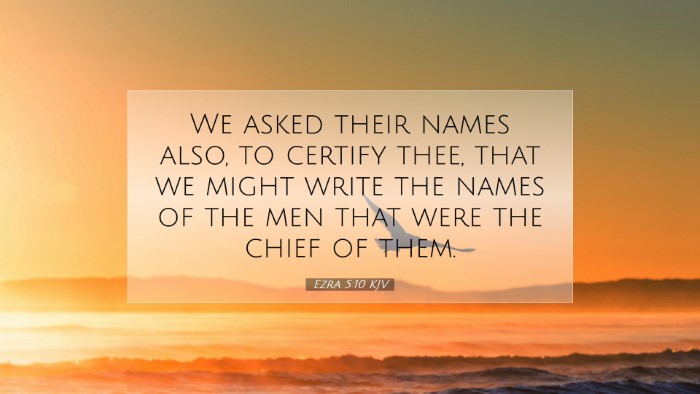Old Testament
Genesis Exodus Leviticus Numbers Deuteronomy Joshua Judges Ruth 1 Samuel 2 Samuel 1 Kings 2 Kings 1 Chronicles 2 Chronicles Ezra Nehemiah Esther Job Psalms Proverbs Ecclesiastes Song of Solomon Isaiah Jeremiah Lamentations Ezekiel Daniel Hosea Joel Amos Obadiah Jonah Micah Nahum Habakkuk Zephaniah Haggai Zechariah MalachiEzra 5:10
Ezra 5:10 KJV
We asked their names also, to certify thee, that we might write the names of the men that were the chief of them.
Ezra 5:10 Bible Commentary
Commentary on Ezra 5:10
Ezra 5:10 reads: "We asked their names also, to inform you, that we might write the names of the men that were chief of them." This verse occurs during the rebuilding of the temple in Jerusalem, showing how the leaders of the Jewish people responded to opposition and scrutiny from local authorities.
Contextual Background
In the historical narrative found in the Book of Ezra, the return of the Jewish exiles from Babylonian captivity and the subsequent rebuilding of the temple are pivotal themes. This section of Scripture highlights the challenges faced by the Israelites, including external opposition and internal governance.
Verse Analysis
This verse showcases the diligence of the Jewish leaders in addressing inquiries concerning their activities. Let’s break down a few key components:
- Inquiry into Authority: The leaders showed a commendable awareness of the implications of their work and the necessity to identify their leaders. This request for names reflects a desire for transparency and accountability.
- Purpose of Documentation: By writing the names of the chief men, they not only aimed to address the queries posed by the governing officials but also likely sought to establish a record of legitimacy for their undertaking. Documentation was vital for the historical and spiritual legacy of their mission.
Theological Implications
Ezra 5:10 prompts us to consider several theological concepts:
- Leadership and Accountability: The need for clear leadership within the community reflects God's design for order and governance. Leaders must be known and identified within the body of believers.
- The Role of Authority: The inquiry into their activities emphasizes the relationships between spiritual endeavors and civil authorities. This verse reflects the reality that Christian leaders should not shy away from accountability to civil government.
- Faithfulness in Adversity: The context of external pressure requires faithfulness. The leaders’ response indicates a trusting reliance on God's providence as they navigate their mission amidst opposition.
Insights from Commentators
Matthew Henry
Henry posits that the act of questioning reflects a higher moral responsibility. He emphasizes that this inquiry serves to unite the community in purpose and integrity. A leader's openness to be questioned and their willingness to respond properly is a sign of a true shepherd. According to Henry, the principle behind this suggests that God supports those who endeavor to enhance His glory.
Albert Barnes
Barnes focuses on the importance of records in this chapter. He infers that the written names of leading figures was a necessary measure to ensure accountability. They were not just mere names but representatives of the faith-filled mission of God's people. Barnes highlights the connection between the civil authorities and the church, showing that both realms require a function of accountability through proper documentation.
Adam Clarke
Clarke discusses the structural and leadership aspects of this verse. He notes that the leaders exercise wisdom, demonstrating that they knew the importance of proper communication with external bodies. Clarke also draws attention to the notion that discernment and prudence in their actions signify a profound respect for the witness of faith amidst scrutiny.
Application for the Church Today
As modern believers reflect on Ezra 5:10, several applications emerge:
- Transparency in Leadership: Churches should encourage transparency among leaders. The model seen in Ezra serves to remind us of the importance of accountability in church governance and decision-making.
- Responding to Authority: The example set by the leaders in Ezra prompts contemporary churches to recognize their responsibility in engaging with local authorities, being mindful of the witness they bear in society.
- Courage in Adversity: Believers are called to remain steadfast and faithful in the face of opposition, mirroring the spirit of the leaders in Ezra’s time. In our lives, we must trust in God’s provision as we fulfill our calling.
Conclusion
In summary, Ezra 5:10 encapsulates vital aspects of leadership, accountability, and the necessary interaction between spiritual endeavors and civil scrutiny. The insights from public domain commentaries not only enhance our understanding of this verse but also challenge us to embody these principles in our contemporary contexts. As we strive for both spiritual fidelity and practical responsibility, may we draw strength from the examples set forth in Scripture.


